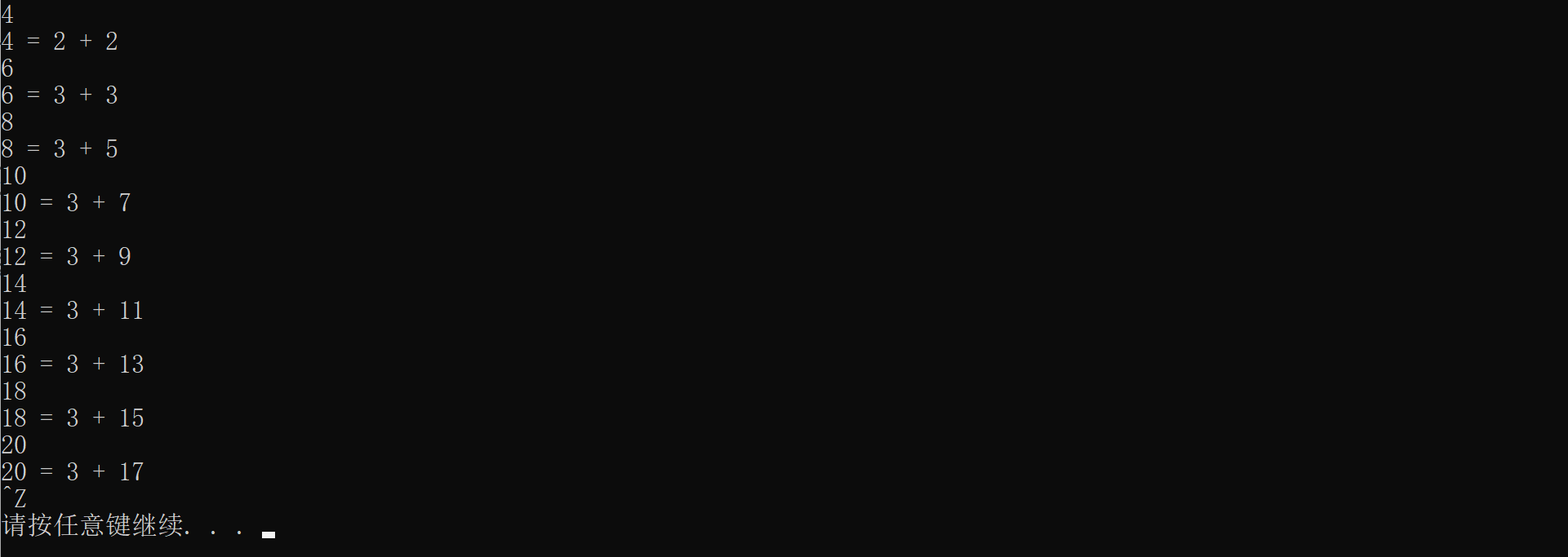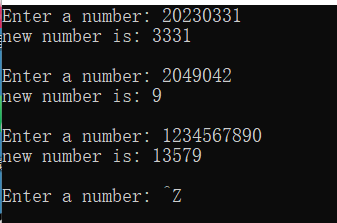实验3
Task1
<实验结论>
#include <stdio.h>
#include <stdlib.h>
#include <time.h>
#include <windows.h>
#define N 80
void print_text(int line, int col, char text[]); // 函数声明
void print_spaces(int n); // 函数声明
void print_blank_lines(int n); // 函数声明
int main()
{
int line, col, i;
char text[N] = "hi, April~";
srand(time(0)); // 以当前系统时间作为随机种子
for(i = 1; i <= 10; ++i)
{
line = rand() % 25;
col = rand() % 80;
print_text(line, col, text);
Sleep(1000); // 暂停1000ms
}
system("pause");
return 0;
}
// 打印n个空格
void print_spaces(int n) {
int i;
for(i = 1; i <= n; ++i)
printf(" ");
}
// 打印n行空白行
void print_blank_lines(int n) {
int i;
for(i = 1; i <= n; ++i)
printf("\n");
}
// 在第line行第col列打印一段文本
void print_text(int line, int col, char text[]) {
print_blank_lines(line-1); // 打印(line-1)行空行
print_spaces(col-1); // 打印(col-1)列空格
printf("%s", text); // 在第line行、col列输出text中字符串
}
**程序功能:
在输出区任意位置随机打印出指定字符
Task2
<实验结论>
task2_1
// 利用局部static变量的特性,计算阶乘
#include <stdio.h>
#include <stdlib.h>
long long fac(int n); // 函数声明
int main()
{
int i, n;
printf("Enter n: ");
scanf("%d", &n);
for (i = 1; i <= n; ++i)
printf("%d! = %lld\n", i, fac(i));
system("pause");
return 0;
}
// 函数定义
long long fac(int n)
{
static long long p = 1;
p = p * n;
return p;
}**增加一行源代码后
// 利用局部static变量的特性,计算阶乘
#include <stdio.h>
#include <stdlib.h>
long long fac(int n); // 函数声明
int main()
{
int i, n;
printf("Enter n: ");
scanf("%d", &n);
for (i = 1; i <= n; ++i)
printf("%d! = %lld\n", i, fac(i));
system("pause");
return 0;
}
// 函数定义
long long fac(int n)
{
static long long p = 1;
printf("p = %2lld ",p);
p = p * n;
return p;
}
task2_2
// 练习:局部static变量特性
#include <stdio.h>
#include <stdlib.h>
int func(int, int); // 函数声明
int main()
{
int k = 4, m = 1, p1, p2;
p1 = func(k, m); // 函数调用
p2 = func(k, m); // 函数调用
printf("%d, %d\n", p1, p2);
system("pause");
return 0;
}
// 函数定义
int func(int a, int b)
{
static int m = 0, i = 2;
i += m + 1;
m = i + a + b;
return m;
}
**实验运行结果与理论分析结果一致
<实验总结>
局部static变量特性:
1、变量只能被一个函数所使用,若在其它函数中用会被视为非法
2、变量值的存储为静态存储,函数退出后,变量依然存在
Task3
<实验结论>
#include <stdio.h>
#include <stdlib.h>
long long func(int n); // 函数声明
int main()
{
int n;
long long f;
while (scanf("%d", &n) != EOF)
{
f = func(n); // 函数调用
printf("n = %d, f = %lld\n", n, f);
}
system("pause");
return 0;
}
// 函数定义
long long func(int n)
{
while(n >= 0){
if(n == 0)
return 0;
else
return 2*func(n-1) + 1;
}
}
Task4
<实验结论>
#include <stdio.h>
#include <stdlib.h>
int func(int n,int m);
int main()
{
int n,m;
while(scanf("%d%d",&n,&m)!=0)
printf("n = %d,m = %d,ans = %d\n",n,m,func(n,m));
system("pause");
return 0;
}
int func(int n,int m)
{
if(n == m || m == 0)
return 1;
else if(n < m)
return 0;
else
return func(n-1,m) + func(n-1,m-1);
}
Task5
<实验结论>
task5_1
#include <stdio.h>
#include <stdlib.h>
double mypow(int x, int y); // 函数声明
int main()
{
int x, y;
double ans;
while(scanf("%d%d", &x, &y) != EOF) {
ans = mypow(x, y); // 函数调用
printf("%d的%d次方: %g\n\n", x, y, ans);
}
system("pause");
return 0;
}
// 函数定义
double mypow(int x,int y)
{
int i;
double ans=1.0;
if(y > 0){
for(i=0;i<y;i++)
ans *= double(x);
return ans;
}
if(y == 0)
return 1;
if(y < 0){
for(i=0;i<(-y);i++)
ans *= double(x);
return 1 / ans;
}
}
task5_2
#include <stdio.h>
#include <stdlib.h>
double mypow(double x, int y); // 函数声明
int main()
{
int x, y;
double ans;
while(scanf("%d%d", &x, &y) != EOF) {
ans = mypow(x, y); // 函数调用
printf("%d的%d次方: %g\n\n", x, y, ans);
}
system("pause");
return 0;
}
// 函数定义
double mypow(double x,int y)
{
if(y > 0)
return x * mypow(x,y-1);
if(y == 0)
return 1;
if(y < 0)
return 1 / x * mypow(x,y+1);
} 
Task6
<实验结论>
#include<stdio.h>
#include<stdlib.h>
void hanoi(unsigned int n, char from, char temp, char to);
void moveplate(unsigned int n, char from, char to);
int tot;
int main() {
unsigned int n;
while (scanf_s("%u", &n) != EOF) {
tot = 0;
hanoi(n, 'A', 'B', 'C');
printf("一共移动了%d次\n", tot);}
system("pause");
return 0;
}
void hanoi(unsigned int n, char from, char temp, char to) {
if (n == 1) {
moveplate(n, from, to);
}
else {
hanoi(n - 1, from, to, temp);
moveplate(n, from, to);
hanoi(n - 1, temp, from, to);
}
}
void moveplate(unsigned int n, char from, char to) {
tot ++;
printf("%u:%c-->%c\n", n, from, to);
}
Task7
<实验结论>
#include<stdio.h>
#include<stdlib.h>
int is_prime(int x);
int main() {
int i, n;
while (scanf_s("%d", &n) != EOF) {
for (i = 2; i <= n; i++) {
if (!is_prime(i) || !is_prime(n - i))continue;
printf("%d = %d + %d\n", n, i, n - i);
break;
}
}
system("pause");
return 0;
}
int is_prime(int x) {
int i;
for (i = 2; i *i<= x; i++) {
if (x % i == 0) {
return 0;}
else {
return 1; }
}
}
Task8
<实验结论>
#include <stdio.h>
#include <math.h>
#include<stdlib.h>
long func(long s);
int main() {
long s, t;
printf("Enter a number: ");
while (scanf("%ld", &s) != EOF) {
t = func(s);
printf("new number is: %ld\n\n", t);
printf("Enter a number: ");
}
system("pause");
return 0;
}
long func(long s)
{
long ans,z=0,q=0,j;
for(;s!=0;){
ans = s % 10;
s = s / 10;
if(ans%2 != 0)
z = z*10 +ans;
}
for(;z!=0;){
j = z % 10;
z = z/10;
q = q*10 + j;
}
return q;
}




 浙公网安备 33010602011771号
浙公网安备 33010602011771号